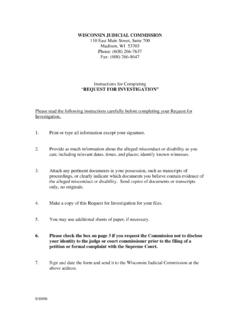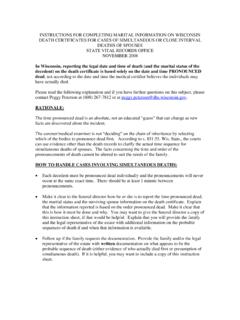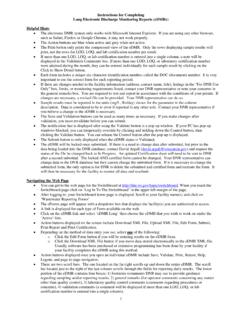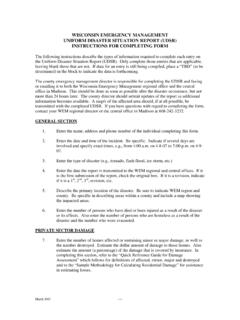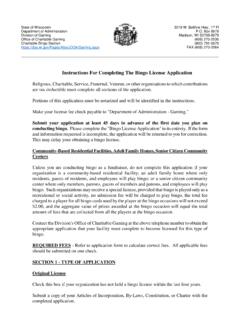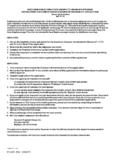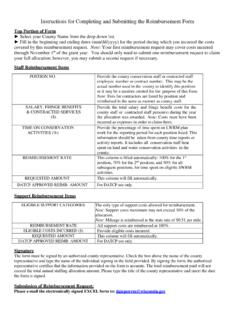Transcription of 2017 I-128 Instructions for Completing Wisconsin Schedule ...
1 CAUTION: At the time these Instructions were posted to the Internet (December 15, 2017), Congress was still in session. If any federal laws that affect 2017 returns are enacted later this year or in January, 2018, any additional differences will be added to the Instructions . In addition, some of the items listed in these Instructions have expired for federal tax purposes. The descriptions of the expired provisions are shaded in grey. If Congress subsequently extends these provisions, the Schedule I Instructions will be adjusted accordingly. Even though extended for federal purposes, the provisions will not apply for Wisconsin for 2017.
2 I-128 (R. 12-17) Wisconsin Department of RevenueGeneral InstructionsIntroduction Generally, the Wisconsin Statutes require that the computation of taxable income on the 2017 Wisconsin income tax return is to be based on the Internal Revenue Code enacted as of December 31, 2016. Changes made to the Internal Revenue Code enacted after December 31, 2016, do not apply for Wisconsin income tax purposes unless adopted by Wisconsin law also provides that certain provisions of federal law do not apply for Wisconsin purposes (even though the provisions were enacted into federal law prior to December 31, 2016).
3 Some of those provisions are: Domestic production activities deduction Exclusion for small business stock Special depreciation allowanceAs a result, certain income and deduction items may be different for Wisconsin and federal purposes. Any difference must be adjusted on this Schedule . A description of each item requiring adjustment can be found in the Line Instructions for Part Must File If the computation of your federal adjusted gross income or itemized deductions reflects any of the differences in Wisconsin and federal law for 2017, you must complete this Schedule and attach it to your Wisconsin income tax return, Form 1 or Form the extent Schedule I adjustments in a prior year affect income or expense items in 2017 (for example, the depreciation difference related to bonus depreciation did not apply for 2014-2016)
4 , you must also make adjustments on Schedule I f o r 2 also may be necessary to prepare a 2017 Schedule I to adjust the amount of gain or loss reportable from sales of certain assets during 2017 (for example, gain from the sale of certain small business stock is taxable for Wisconsin but not for federal tax purposes). See the line Instructions for information on the provisions of federal law that do not apply for a Different Federal Election for Wisconsin Various elections are available under the federal Internal Revenue Code (IRC). When an election is available, a taxpayer may choose one election for federal tax purposes and a different election for Wisconsin .
5 For example, a taxpayer may elect to claim different amounts of IRC sec. 179 expense for federal and Wisconsin tax purposes. Either of the following two methods may be used to claim a different election for Wisconsin and federal tax purposes. Prepare a pro forma federal return based on the election chosen for Wisconsin . This pro forma return is to be attached to the Wisconsin Form 1 or Form 1 NPR instead of the actual return filed for federal tax purposes. Make the election using Wisconsin Schedule I, Adjustments to Convert 2017 Federal Adjusted Gross Income and Itemized Deductions to the Amounts Allowable for : For federal tax purposes you claim the credit under sec.
6 45E of the Internal Revenue Code (IRC) for 50 percent of the startup costs of a small employer pension plan. When claiming the credit, you must reduce your deduction for that portion of the startup costs equal to the credit. However, 45E(e)(3), IRC, provides an election to not claim the credit. Because an election is available, you may elect to not claim the credit on your federal return and instead claim the deduction for the startup costs. Use either of the two methods listed above to make a different election for Wisconsin sure to also adjust any other items on your federal return that are affected by the election.
7 For example, if you claim a different election for sec. 179 expense, this would also affect the amount of depreciation allowed and your depreciation deduction should also be adjusted. In addition, a change in your federal adjusted gross income (FAGI) would also affect itemized deductions that are limited by FAGI. See Instructions for Part for Completing Wisconsin Schedule I 20172 Partners, Beneficiaries of Estates and Trusts, and Shareholders of Tax-Option (S) Corporations The income and deduction items computed on the Wisconsin returns of partnerships, estates and trusts, and tax-option (S) corporations may also be affected by the differences between Wisconsin and federal law for 2017.
8 As a result, the distributive shares of these items which are reportable on the individual Wisconsin income tax returns of the respective partners, beneficiaries, and shareholders may differ for Wisconsin and federal income tax purposes. Such partners, beneficiaries, and shareholders should receive notification from the partnership, estate or trust, or tax-option (S) corporation of the amounts reportable for Wisconsin purposes. By comparing the amounts reportable for Wisconsin and federal purposes, the partner, beneficiary, or shareholder should determine the items which differ and make the appropriate : When adjusting income or expenses of an entity, additional items may also require adjustment.
9 For example, adjusting depreciation allowed to a partnership would change the amount of income or loss from the entity. If the entity is subject to the passive activity limitations, federal Form 8582, Passive Activity Loss Limitations, would need to be recomputed for Wisconsin to substitute the Wisconsin partnership information for the amount determined on the federal Form 8582. Any difference in the amount of passive activity loss allowed for federal tax purposes and the amount allowed from the recomputed Form 8582 would also be a Schedule I adjustment.
10 Any other federal schedules or forms affected by the Schedule I adjustment should also be recomputed (for example, Schedule E) and attached to the Wisconsin return. Mark these recomputed forms or schedules Revised for Wisconsin . Specific InstructionsFollowing are brief explanations of differences between federal and Wisconsin law (numbered to correspond with the line numbers on Schedule I.)The Federal explanation indicates how an item is to be treated for federal income tax purposes as of December 31, 2017. The Wisconsin explanation indicates how the item is to be treated for you need additional information regarding these items, contact any Wisconsin Department of Revenue office.
